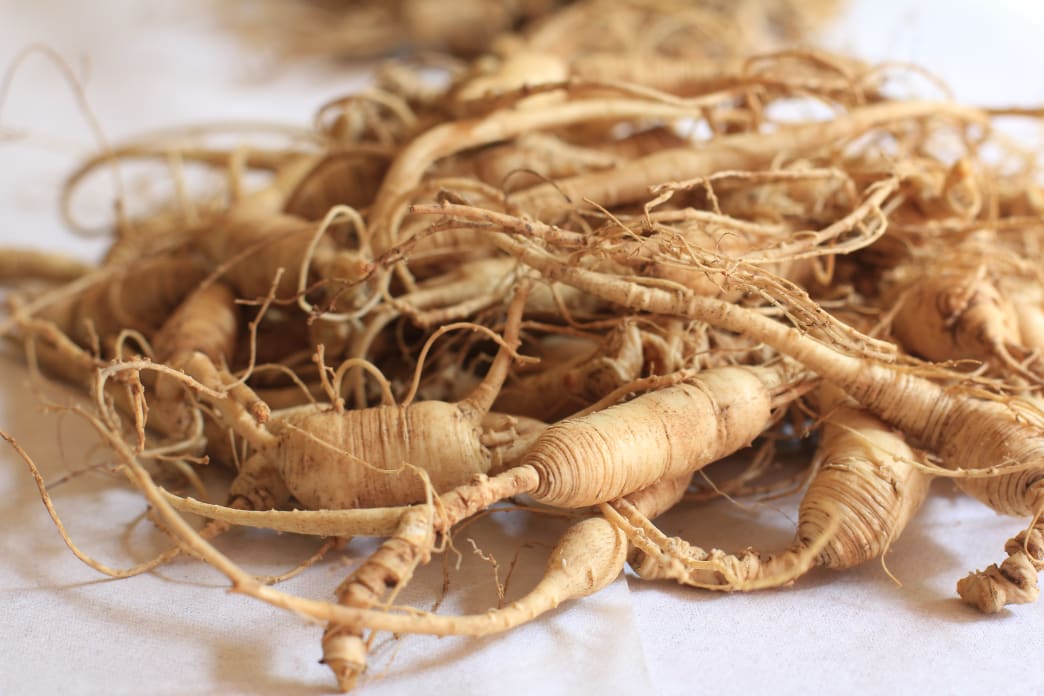
5 Chinese Herbs to Reduce Stress & Restore Balance
According to Traditional Chinese Medicine (TCM), the whole of creation springs from the marriage of two opposite principles—yin and yang. Earth and sky, winter and summer, night and day, hot and cold—these are all manifestations of this dynamic. The aim of TCM is to restore harmony between these opposites.
TCM excels at enhancing recuperative power and immunity, protecting and preserving health every day. There’s the prevailing idea that Chinese herbs are exotic or unusual because they come from China. Really, though, there’s nothing special about Chinese herbs compared to any other; they just happen to grow in Asian soil. Here are five Chinese herbs for overall wellness, stress reduction, energy, and immune support.
1. Ginseng
Known as the “King of Herbs,” ginseng (Panax ginseng) is used for a multitude of conditions, and it is often taken daily to maintain general good health. According to TCM, ginseng helps with the following:
- Normalize the body systems under stress
- Replenish vital energy
- Strengthen the immune system
- Improve mental and physical capacity for work
- Stimulate blood circulation
- Increase learning and memory
- Replenish sexual vitality
This well-known herb contains compounds that have, in laboratory studies, improved learning and memory in rats. One theory suggests the herb may improve the delivery of blood and oxygen to tissues. Ginseng is generally indicated for daily, consistent use in moderate doses for adults. It can be safely taken as a tea or in capsules at 3 g per day over a period of years—and even decades.
2. Dong Quai
A superb tonic and very popular Chinese herb, dong quai root (Angelica sinensis), called the “Queen of herbs,” may be the most extensively used herb in the world. Half a billion women in China alone, as well as millions in other Asian countries, especially Japan, take dong quai daily as an all-around health builder, as well as to regulate periods and “strengthen” reproductive organs. In Chinese, dong quai translates as “return to proper order.”
For an energy boost, particularly for women premenstrually, an Asian woman might cook dong quai into soup or rice dishes on a daily basis for several days. In TCM, it is recommended for high blood pressure, atherosclerosis, asthma, bronchitis, anemia, and increasing blood flow throughout the body. Dong quai has a strong celery-like taste and smell. Use the root (5–25 g per day) in tea or food, or take as a supplement. Do not take during pregnancy.
3. Schisandra
The Chinese name for schisandra berry (Schisandra chinensis) is wu-wei-tze, or “five flavor berry.” The skin and the pulp of the fruit are sweet and sour, the kernels are pungent and bitter, and the whole berry has a salty taste. Schisandra is essentially a general tonic, that is used to “prolong the years of life without aging,” similar to what ginseng is used for. Traditionally, athletes have used schisandra to increase endurance and fight fatigue under physical stress, and it is used as a male sexual tonic. Scientific studies show that mice taking this herb increased treadmill running time and working capacity. Schisandra berries are tasty, and they can be taken as a tea or in supplements. The TCM dose is 10 g per day.
4. Ho Shou Wu
Ho shou wu (Polygonum multiflorum) root, also called “fo-ti,” is considered a superior medicine in TCM. Ho shou wu is a tonic that promotes stamina and overall balance, and that is also used to support healthy cholesterol and strengthen the heart. It can be taken as a supplement or added to food at as dose of 5 g daily.
5. Astragalus
Astragalus (Astragalus membranaceus) is a powerful energy booster and immune system enhancer. In TCM, it’s used mainly for long-term disease prevention.
Astragalus assists in healing from chronic illness, increases stress adaptation, is antiviral, and amplifies the efficiency of just about every type of immune function. One animal study indicates that astragalus acts against Coxsackie virus, lending scientific support to the herb’s immune benefit. Dried, sliced astragalus root can be found at most Asian grocery stores. It is also readily available as a supplement. Use ½–1 oz, dry herb weight, brewed, per day, or take as a supplement.
Written by Karta Purkh Singh Khalsa for Better Nutrition and legally licensed through the Matcha publisher network. Please direct all licensing questions to legal@getmatcha.com.
